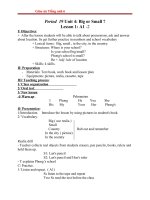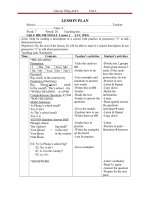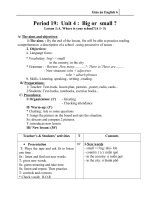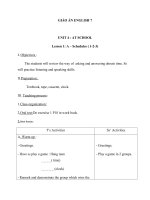Giáo án Tiếng Anh 12 unit 4: School education system
Bạn đang xem bản rút gọn của tài liệu. Xem và tải ngay bản đầy đủ của tài liệu tại đây (133.37 KB, 11 trang )
GIÁO ÁN TIẾNG ANH 12
Unit 4: School education system
Lesson 1: Reading
1. Objectives:
By the end of the lesson, Ss will be able to:
guess the meaning in context.
scan for specific information.
know about school education system in English.
2. Teaching aids:
Textbooks, pictures, handouts.
3. Procedure:
Time
Teacher’s activities
5’
Warm – up
- T. gives questions (yes, no) from the fact about school in
Vietnam
a. Do children start grade 1 when they are 6 years old?
b. Is schooling compulsory from the age of 6 to 16?
c. Does the school year generally begin in September and end
in late May? ….
- T check the answers, gives the summaries
- T leads sts into new lesson
Ss’ activities
Whole class
8’
Whole class
Individual work
12’
Pre- reading
* Vocabulary:
- compulsory ( adj ):
- certificate (n)
- curriculum (n)
- tuition fees (n)
- state school (n)
- Ask Ss to decide if the statements are T or F (according to
the sentences at the pages of 44).
Expected answers: 1-T 2-F 3-F
4-F 5-T
Feedback and comments.
While - reading
a, Activity 1: Questions and answer ( Task 2 – page 46)
- Ss read the passage and answer the questions.
- Asks Ss to compare the answer with the partners.
- Call on some Ss to write the answers on the board.
* Expected answers:
Group work
Pair work
Time
Teacher’s activities
Ss’ activities
1. From the age of 5.
2. 3 terms.
3. The state school and the “independent” or “ public” school
systems.
4. Yes, they do
5. There are 3 core subjects( English, Math and Science).
- Teacher checks and corrects.
8’
2’
b, Activity 2: Gap- filling:
School is (1)__________ for all English children from the
age of 5 to 16. The academic year in England runs from
(2)____________ to July and is (3)________ into 3 terms.
(4)__________ term is from the beginning of September to
mid- December. Spring term is from the beginning of January
to mid- March and (5)_________ term from early April to
mid- July. Each term is separated by one week (6)_________
called half term.
- Delivers handouts and puts Ss to work in pairs.
- Asks them fill in and speak out the answers.
* Gives feedback.
Keys: 1, compulsory
4, Autumn
2, September
5, summer
3, divided
6, break
Post - reading.
* Stop and correct:
- Ask Ss to read the 2nd paragraph carefully for 5 minutes and
then close their books.
- Ss listen and shout “Stop” when they realize the wrong information.
- Ask Ss to correct the wrong information.
- Tell Ss to open their books and check the answers.
There are (1)________ paralled school system in England.
The first is the (2)___________ school system, which is free to
all students, paid for by the (3)__________ . The second
category is the “independent” or (4)___________ school
system, which is (5)_________ by students. The state school
system which educates (6)____________ of the pupils in
England can (7)__________ into two levels of education:
primary education and (8)___________ education.
* Mistake correction:
1- two
2- state
3- state
4- private
5- fee paying 6- 93%
7- divided
8- secondary
Homework
Group work
Whole class
Pairwork
Whole class
Time
Teacher’s activities
- Ask Ss to write a short paragraph about the most difficult school
subjects and solutions to the better study of the subjects.
Ss’ activities
Unit 4: School education system
Lesson 2: Speaking
1. Objectives:
By the end of the lesson, Ss will be able to:
Get some knowledge of education.
Talk about the school education system in Vietnam and England.
2. Teaching aids:
Picture and handouts.
3. Procedure:
Time
Teacher’s activities
Warm- up
5’
- Choose the correct wordsto fill into the gaps
(Kindergarten, Primary school, Lower and Upper secondary school)
a, When you are from 4 to 5 years old, yo have to go to……
b, When you are from 6 to 10 years old, yo have to go to……
c, When you are from 11 to 14 years old, yo have to go to……
d, When you are from 15 to 17 years old, yo have to go to……
*Keys:
a, Kindergarten.
b, Primary school.
c, Lower secondary school.
d, Upper secondary school.
6’
8’
Ss’ activities
Whole class
Pre - speaking
- Reorder the phrases in to the corret levels of education from
low to high education system
a, Upper secondary school. c, Kindergarten .
b, Nursery school
d, Lower secondary school.
- Check and comment.
*Keys: 1.b 2.c 3.d 4.a
Group work
While - Speaking
Task 1: Questions and answers (Page 47)
-Ask and anser the question about the school education system
in Vietnam.
- Ss work in pairs.
- Hang on the questions on the board:
1.When do the children to start primary school in Vietnam?
2. How long does primary school last?
3. When do they go to lower secondary school? upper secondary
school?
4.How long does the secondary school last?
5. How many levels of education system in Vietnam and What are
Pair work
Time
12’
12’
2’
Teacher’s activities
they?
- Call on some pairs of Ss to answer the questions.
- Correct.
Task 2: Talk about the school education system in Vietnam
using the information from task 1.
- Break the class into 4 groups.
- Practise speaking about the school education system
inVietnam.
- Call some Ss to speak out.
- Give feedback and make comment.
*Suggested answers : There are 4 levels of education in
Vietnam: Pre- school, primary school, Lower and upper
secondary school.Children oftengo to Pre- school when they
are one year, which is optial, Primary and lower secondary
education are compulsory in Vietnam…
Post-Speaking
* Write about the similarities and differences between the
school system in Vietnam and England.
- Divide the class into six groups and give each group a poster
and a board marker.
- 3 groups write about the similarities and the others write
about the differences.
- Have Ss to tick on the poster and report the result to the class.
- Give feedback and comment.
* Suggested answers:
*Similarities
*Differences
3 levels of education
Age of the pre- school
Homework
- Write a short paragraph about the school education system in
Vietnam
Ss’ activities
Pair work
Group work
Group work
Whole class
Unit 4: School education system
Lesson 3: Listening
1. Objectives:
By the end of the lesson, Ss will be able to:
- Listen for the understanding of the conversation.
- Know more about the school education in Vietnam.
2. Teaching aids:
Tapes, posters, handouts.
3. Procedure:
Time
Teacher’s activities
5’
Warm - up
- Play a game : jumbled words about subjects at school.
- Give Ss the handouts with the words:
1.n f h c e r
2. p i s s h y c
3. s a a t c m h m e i t
4. e r t u a r l i t e
5.p g g y o a e r h .
- Ask Ss to work in groups of four.
- Call on some Ss to give the words.
- Congratulate th winner.
Keys: 1. French
2. physics
3. Mathematics
4. Literature
5. Geography.
*Lead- in : Now we will listen to the conversation between
Jenny and Gavin talking about what they do at school.
10’
Pre - listening
* T asks sts to discuss 2 questions (pairwork)
a. What school subjects are you good at?
b. Which ones do you enjoy most/ least in your class? Why?
- Sts give the answers.
Vocabulary - teaching
- tear away (n) >< well behaved
- disruptive (a) >< careful
- struggle (n) = difficulty
While- Listening
10’
a,Task 1:Listen to the conversation between Jenny and
Gavin…(Tape 1-Page 48)
- Play the tape twice
- Listen and put a tick to the the question which the answer is
“Yes”.
- Go over the answer with the class.
- Play the tape one more time for Ss to check the answers.
b,Task 2: Listen and answer the questions
12’
- Divide the class in ti 4 groups, each group has to answer one
Ss’ activities
Whole class
Pair work
Whole class
Individual work
Pair work
Time
6’
2’
Teacher’s activities
question
- Play the tape twice.
- Ask Ss to give the answers on the board.
- Play the tape one more time.
- Comments
post- Listening
- T. ask Ss role - play
+ One is Jenny and the other is Gavin
+ Jenny makes questions
+ Gavin gives answer
Homework
- Write about the result of your current exams at school and
what you will do to prepare for the next exams
Ss’ activities
Pair work
Whole class
Unit 4: School education system
Lesson 4: Writing
1. Objectives:
By the end of the lesson, Ss will be able to :
Describe school education system.
Write a short passage.
2. Teaching aids:
Pictures, handouts, pieces of paper.
3. Procedure:
Time
Teacher’s activities
5’
Warm – up
* Brain storming (Groupwork)
School education system Start school
Primary
Lower secondary school
10’
Pre- writting
*Pair work
T: gives hand out with 8 questions in structions
1. When does a child start school in Vietnam?
2. How many terms are there in a school year?
3. How lony does it take to complete primary ,,,,
T: Checks feedbacks
* Matching, grade in column A with age in column B
A
B
1. Nursery
a. 15 – 17
2. Kindergarten
b. 3 - 4
3. Lower secondary
c. 4 – 5
4. Upper secondary
d. 11 - 14
- Ask sts to match.
- Checks and corrects.
18’
While - writing
- T: divide class in to 3 groups - explains how ... what
to ......a paragraph on the formal school education system
in Vietnam
- Sts: Use the informations in the given hand outs to conite
about the school education system … be gin as follows.
- There are two levels of ducation in the formal school
system in Vietnam - vrimary education and secondary
school education …
- T: goes nound and support some vocabulary and
structures. Remind them to use the tense of verbs
Ss’ activities
Whole class
Group work
Pair work
Group work
Group work
Time
Teacher’s activities
Ss’ activities
10’
Post - writing
- Hang on the groups’ writing on the board
- Ask sts to make correction and comment
- Give feedback
* Suggested answer
There are 3 levels of education in Vietnam, they are
pre-school, secondary school, upper school, primary lasts 5
years, starts school from the age of 6 to 10, lower secondary
school lasts 4 years from the age of 11 to 14 and upper
secondary is 3 years from the age of 15 to 17. Primary and
lower secondary are compulsory education and last 9 years,
the academic year has 35 weeks with 9 months from
September to May…
Whole class
Individual work
2’
Homework
- Rewrite the paragraph carefully
- Prepare for the next lesson.
Whole class
Unit 4: School education system
Lesson 5: Language focus
1. Objectives:
By the and of the lesson, sts will be albe to:
- Get some rules of the stress in three syllable words
- Use the passive voice
2. Teaching aids:
- Pictures, handouts, charts, English book, cassette the player
3. Procedure:
Time
Teacher’s activities
8’
Warm – up
A. Pronunciation
- Give each group 3 pieces of paper on which there are stress
patterns of 3
- Syllable words
0oo
o0o
oo0
- Play the tape/ CD, sts have to raise the corresponding pattern.
- checking
- carefully
- primary
2- let sts listen again and repeat (one by one word)
3- Ask sts to read the sentences in the text book loudly
- Check and correct if necessary
New lesson
B. Grammar
I. Presentation
8’
- Give the handouts
- Ask sts to complete the table
Active
Passive
1. We water the plants everyday
1. The plants are
2. We .... the plants now
watered everyday
3. We watered the plants yesterday
2.the plants are being
4. We have just watered the plants
watered now
5- When the phone rang we
3. We .... the plants yesterday
were watering the plants
4. ....
5. .....
- Call on some sts to read the form of the verb
- Revise and explain if necessary and give the form
17’
II. Practice
a. Exercise 1. Let sts work in groups (3 groups)
- Let sts go to the board and write all the verbs
G1
G2
G3
Ss’ activities
- Work in groups
listen the words
and raise the card
The whole class
Individuals
The whole class
Work in pairs
Work in groups
to do Ex 1
- Sts go to the
board to write the
form of the verbs
Time
10’
2’
Teacher’s activities
- Checking
Correct and declare the winner
(the group which has finished first, has the most correct verbs
will win).
b. Exercise 2: Group word (3 groups)
- Each group rewrite 3 sentences
- T goes round and correct
- Sts stand up to present
- Feedback
C. Production
T gives some verbs for sts to make sentences
Focus on passive sentences
Eg: separate, divide, set, make, build.
Summary and Homework:
- Exercise 3 (p.51)
- Exercises in the word book
Ss’ activities
(one by on)
Work in groups









